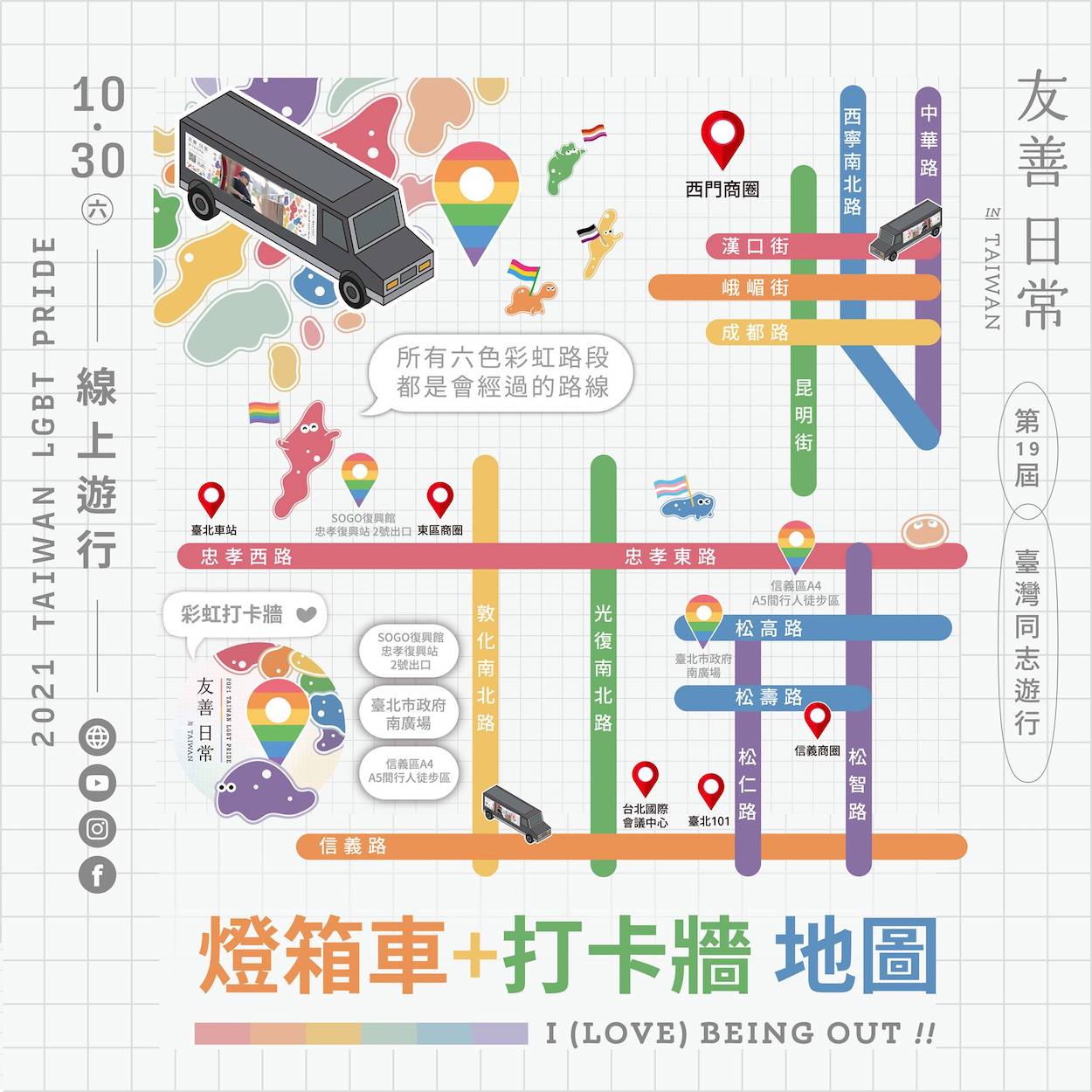by Brian Hioe
語言:
English
Photo Credit: 臺灣同志遊行 Taiwan LGBT Pride/Facebook
THE ANNUAL PRIDE parade that takes place in Taiwan on October 30th took place primarily online this year, along with the third annual Trans March, which was also moved to livestream programming.
The COVID-19 outbreak that began in May is gradually stabilizing, allowing for the relaxation of restrictions on mask-wearing and outdoor events. However, the change in the COVID-19 situation was too late to change plans for holding a live streaming event.
Last year, the pride parade drew 130,000 participants according to organizers, making Taiwan one of the few places in the world able to commemorate pride with a mass gathering. The annual pride parade in Taiwan is usually a transnational event, in which visitors come from all around the world—not only from other parts of Asia, such as Thailand or Japan, but with significant numbers of visitors from the US and Europe.
 Diagram of the events planned for today. Photo credit: 臺灣同志遊行 Taiwan LGBT Pride/Facebook
Diagram of the events planned for today. Photo credit: 臺灣同志遊行 Taiwan LGBT Pride/Facebook
Interest in visiting Taiwan for the pride parade has likely increased after the legalization of gay marriage in Taiwan in 2019. Nevertheless, having visitors from abroad was not possible last year, given the closure of borders. Taiwan’s pride parade is usually seen as Asia’s largest, hence why it draws so many international visitors.
Despite the lack of a physical pride parade, apart from the livestream, various pride events were being held across Taipei at smaller venues. Aspects of the event were hybrid in nature. For example, stages were set up for simultaneous live streaming in various parts of Taipei, and places for visitors to take photos to post on social media were set up.
That being said, LGBTQ-oriented businesses that normally see a peak period for business during pride are likely to take a hit from the lack of any physical pride parade this year. Such businesses would already have been heavily affected by the COVID-19 outbreak, given the inability of bars and restaurants to operate during much of the outbreak or that they were required to operate at reduced capacity. Perhaps with this in mind, some of the advertising for the pride parade this year focused on introducing LGBTQ-friendly or LGBTQ-oriented businesses, including venues where drag performances take place such as Cafe Dalida and Locker Room.
More generally, customers have proved more reluctant to visit bars and restaurants after the outbreak, and the stabilization of the outbreak dovetails with winter, a period in which bars and restaurants normally see lower business due to customers not wanting to go outside into the cold. Government relief measures or efforts to stimulate spending are not likely to make up for the full effect on such businesses, with institutions such as the nightclub Pawnshop, which frequently hosts gay party nights and vogueing performances, having turned towards crowdfunding to stay afloat.
In the meantime, the annual Trans March and pride parade also serves as a reminder of the issues that still need to be addressed for LGBTQ rights in Taiwan. Just a month ago, courts ruled against laws requiring proof of surgery for changing one’s legal gender. Previous requirements for changing one’s legal gender required transgender women to surgically remove their penis and testicles while transgender men were required to surgically remove their breasts, uterus, and ovaries. This meant that trans individuals were sterilized if they wished to change their legal gender.
 Photo credit: 臺灣同志遊行 Taiwan LGBT Pride/Facebook
Photo credit: 臺灣同志遊行 Taiwan LGBT Pride/Facebook
It proves appalling that such laws were on the books until just last month. To this extent, legally allowed gender statuses are only “male” and “female” at present, remaining confined to a binary view of gender. This is an issue flagged recently with plans to introduce new electronic IDs.
Despite a campaign launched in May 2020 to push for the widening of current restrictions on transnational gay marriages, current restrictions stipulate that Taiwanese can only marry individuals from countries that have also legalized gay marriage, and foreigners from countries that have not legalized gay marriage cannot get married in Taiwan. Although a Taiwanese man and his partner from Macau were able to get married in August, the ruling was case-specific and does not widen the scope of transnational gay marriages. The issue is a particularly salient one during COVID-19, with many couples separated due to border restrictions.
Moreover, laws do not allow gay couples to jointly adopt a child unless that child is the biological child of one of the couple. Surrogacy continues to be illegal in Taiwan.
Pride this year—the third pride since gay marriage was legalized in 2019—should be an occasion to reflect on these unresolved issues, then.

